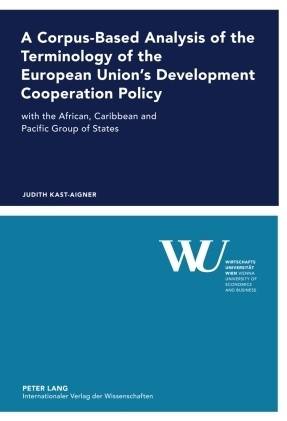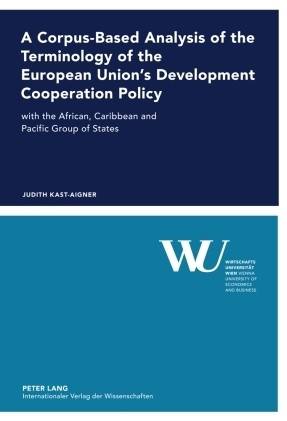
Door een staking bij bpost kan je online bestelling op dit moment iets langer onderweg zijn dan voorzien. Dringend iets nodig? Onze winkels ontvangen jou met open armen!
- Afhalen na 1 uur in een winkel met voorraad
- Gratis thuislevering in België vanaf € 30
- Ruim aanbod met 7 miljoen producten
Door een staking bij bpost kan je online bestelling op dit moment iets langer onderweg zijn dan voorzien. Dringend iets nodig? Onze winkels ontvangen jou met open armen!
- Afhalen na 1 uur in een winkel met voorraad
- Gratis thuislevering in België vanaf € 30
- Ruim aanbod met 7 miljoen producten
Zoeken
A Corpus-Based Analysis of the Terminology of the European Union's Development Cooperation Policy
With the African, Caribbean and Pacific Group of States
Judith Kast-Aigner
€ 100,95
+ 201 punten
Omschrijving
The objective of this study is to provide an account of the terminology the European Union has created and used with regard to its development cooperation policy since the Treaty of Rome was signed in 1957. For this purpose, a terminological analysis has been conducted, based on a corpus of texts produced by the EU in this domain. A corpus-based approach to terminology has been chosen as it opens up the possibility to gather both conceptual and linguistic as well as usage information about the terminological units. Moreover, it allows the study of terms in the context of communicative situations and enables the analysis of concordances that can be used to reveal possible ideological aspects of the terminology involved. The book not only provides a detailed and comprehensive report on the status quo of the EU's terminology in this field. It also reflects the evolution of its terminology since the establishment of a common European development cooperation policy and thus against the background of an ever-changing socio-economic and political situation. The findings are meant to contribute to a better knowledge and understanding of European development cooperation policy as well as to help improve communication between professionals in European and national bodies.
Specificaties
Betrokkenen
- Auteur(s):
- Uitgeverij:
Inhoud
- Aantal bladzijden:
- 310
- Taal:
- Engels
- Reeks:
- Reeksnummer:
- nr. 42
Eigenschappen
- Productcode (EAN):
- 9783631599839
- Verschijningsdatum:
- 9/07/2010
- Uitvoering:
- Hardcover
- Formaat:
- Ongenaaid / garenloos gebonden
- Afmetingen:
- 148 mm x 210 mm
- Gewicht:
- 569 g

Alleen bij Standaard Boekhandel
+ 201 punten op je klantenkaart van Standaard Boekhandel
Beoordelingen
We publiceren alleen reviews die voldoen aan de voorwaarden voor reviews. Bekijk onze voorwaarden voor reviews.











